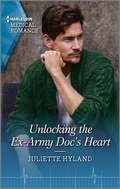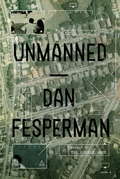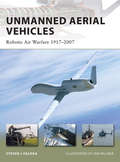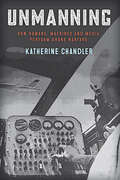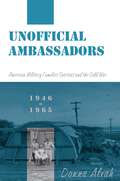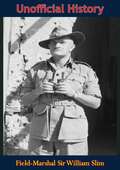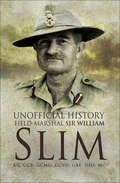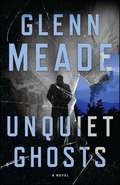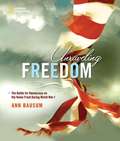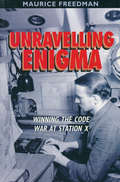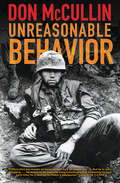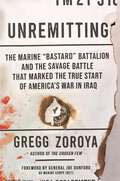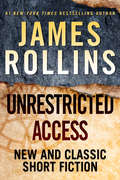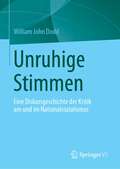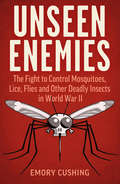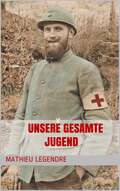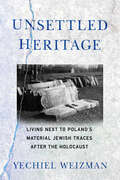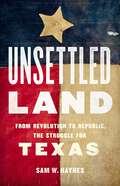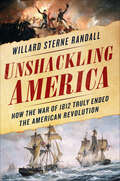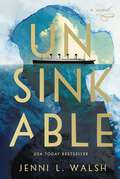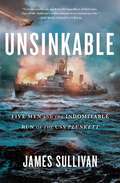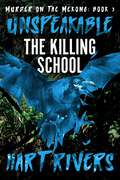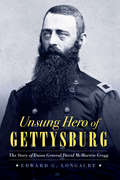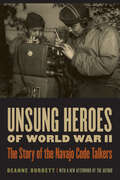- Table View
- List View
Unlocking the Ex-Army Doc's Heart
by Juliette HylandIt will take someone special……to thaw her frozen heart!The Arctic Circle’s remote tranquility made it the perfect place for ex-army doc and former child star Annie Masters to open her clinic. But her cherished anonymity is ruined when celebrity surgeon Rafe Bradstone arrives in town! Seeing that she uses her work as a safe haven, dynamic Rafe seems determined to show her what she’s missing out on. And it’s working… She’s beginning to imagine a future—with him!
Unmanned
by Dan FespermanFrom the widely acclaimed author of The Prisoner of Guantánamo and The Double Game, an electrifying, timely, psychologically gripping descent into the hidden, expanding world of drone warfare. Not very long ago, Darwin Cole was an F-16 fighter pilot. He was a family man. He was on top of the world. Now? He's a washout drunk with a dishonorable discharge from the U.S. Air Force, living alone in the Nevada desert and haunted by an image beamed from one of his last missions as a "pilot" of a Predator drone--a harrowing shot of an Afghan child running for her life. When Cole is approached by three journalists trying to uncover the identity of the possibly rogue intelligence operative who called the shots in Cole's ill-fated mission, Cole reluctantly agrees to team up with them. But in our surveillance culture, even the well intentioned are liable to find themselves under scrutiny, running for their lives, especially when the trail they're following leads to the very heart of that culture--in intelligence, in the military, and among the unchecked private contractors who stand to profit richly from the advancing technology . . . not merely for use "over there," but for right here, right now. From the Hardcover edition.
Unmanned Aerial Vehicles: Robotic Air Warfare 1917-2007
by Steven J. Zaloga Ian PalmerUnmanned aerial vehicles (UAVs) are the most dynamic field of aerospace technology, and potentially the harbingers of new aviation technology and tactics. They have only emerged from the shadows in recent years, but in fact have been in use for decades. After some limited use in World War II, UAVs began to emerge as a substitute for manned reconnaissance aircraft in the 1950s for missions deemed too dangerous to risk an aircrew. Used in significant numbers in the Vietnam War as well as less-heralded missions such as spy flights over China in the 1950s and 1960s, the contemporary UAV began to emerge in the 1980s. This book examines the development of this unique and mysterious technology, revealing how it has changed combat through the years and speculating on its potential to transform the nature of warfare in the future. Steven J. Zaloga examines the pioneering use of UAVs conducted by the Israeli air and the use of UAVs during Operation Desert Storm. Packed with rare, recently declassified photographs and detailed full-color cutaways, this book investigates the wide deployment of UAVs over Iraq and Afghanistan today, and considers the possible future of the UAV as an actual military weapon.
Unmanning: How Humans, Machines and Media Perform Drone Warfare (War Culture)
by Katherine ChandlerUnmanning studies the conditions that create unmanned platforms in the United States through a genealogy of experimental, pilotless planes flown between 1936 and 1992. Characteristics often attributed to the drone—including machine-like control, enmity and remoteness—are achieved by displacements between humans and machines that shape a mediated theater of war. Rather than primarily treating the drone as a result of the war on terror, this book examines contemporary targeted killing through a series of failed experiments to develop unmanned flight in the twentieth century. The human, machine and media parts of drone aircraft are organized to make an ostensibly not human framework for war that disavows its political underpinnings as technological advance. These experiments are tied to histories of global control, cybernetics, racism and colonialism. Drone crashes and failures call attention to the significance of human action in making technopolitics that comes to be opposed to “man” and the paradoxes at their basis.
Unofficial Ambassadors: American Military Families Overseas and the Cold War, 1946-1965
by Donna AlvahAs thousands of wives and children joined American servicemen stationed at overseas bases in the years following World War II, the military family represented a friendlier, more humane side of the United States' campaign for dominance in the Cold War. Wives in particular were encouraged to use their feminine influence to forge ties with residents of occupied and host nations. In this untold story of Cold War diplomacy, Donna Alvah describes how these “unofficial ambassadors” spread the United States’ perception of itself and its image of world order in the communities where husbands and fathers were stationed, cultivating relationships with both local people and other military families in private homes, churches, schools, women's clubs, shops, and other places.Unofficial Ambassadors reminds us that, in addition to soldiers and world leaders, ordinary people make vital contributions to a nation's military engagements. Alvah broadens the scope of the history of the Cold War by analyzing how ideas about gender, family, race, and culture shaped the U.S. military presence abroad.
Unofficial History
by Field-Marshal Sir William SlimLike most members of the professional military freemasonry, Field Marshal Sir William Slim came to admire “all the soldiers of different races who have fought with me and most of those who have fought against me.” Among the most likable of his enemies were the Wazirs of India’s Northwest Frontier. In 1920, Slim took part in a retaliatory raid on an obscure village. It was an unusually easy victory over the canny Wazirs, whom the British took by surprise and escaped from with scant loss. Afterwards, in the casual frontier way, the British sent a message to the Wazirs, expressing surprise at the enemy’s unusually poor shooting. The Wazirs replied in courtly fashion that their rifles were Short Magazine Lee-Enfields captured in previous fights with the British, and that they had failed to sight the guns to accord with a new stock of ammunition. Now, having calculated the adjustment, they would be delighted to demonstrate their bull’s-eye accuracy any time the British wanted. “One cannot help feeling,” Slim says, “that the fellows who wrote that ought to be on our side.” Slim genuinely enjoyed his virtually blood-free skirmishes with such foes as the Turks, the Wazirs and the Italians in 1940 Ethiopia.“An attempt to depict the lives of ordinary men in and out of combat. The accounts are written with style, wit and exceptional humanity.”—Tom Hall-Print ed.
Unofficial History: Field-Marshal Sir Williams Slim
by Sir William SlimA career soldier, veteran of both World Wars, and British war hero remembers the campaigns he fought—and his worthy foes. Like most members of the professional military freemasonry, Field Marshal Sir William Slim came to admire &“all the soldiers of different races who have fought with me and most of those who have fought against me.&” Among the most likable of his enemies were the Wazirs of India&’s Northwest Frontier. In 1920, Slim took part in a retaliatory raid on an obscure village. It was an unusually easy victory over the canny Wazirs, whom the British took by surprise and escaped from with scant loss. Afterwards, in the casual frontier way, the British sent a message to the Wazirs, expressing surprise at the enemy&’s unusually poor shooting. The Wazirs replied in courtly fashion that their rifles were Short Magazine Lee-Enfields captured in previous fights with the British, and that they had failed to sight the guns to accord with a new stock of ammunition. Now, having calculated the adjustment, they would be delighted to demonstrate their bull&’s-eye accuracy any time the British wanted. &“One cannot help feeling,&” Slim says, &“that the fellows who wrote that ought to be on our side.&” Slim genuinely enjoyed his virtually blood-free skirmishes with such foes as the Turks, the Wazirs and the Italians in 1940 Ethiopia. &“An attempt to depict the lives of ordinary men in and out of combat. The accounts are written with style, wit and exceptional humanity.&”—Tom Hall
Unquiet Ghosts: A Novel
by Glenn Meade“Powerful, moving...unforgettable.” —Janet Evanovich, #1 New York Times bestselling author “Glenn Meade doesn’t miss a beat…A high-octane game-changer.” —Steve Berry, New York Times bestselling author of The 14th Colony Eight years ago, her husband and children were killed in a plane crash. Now, new evidence reveals that they didn’t die—her husband deliberately vanished—and that he knows a secret the powerful forces will stop at nothing to keep hidden.Kathy Kelly’s world was shattered when a plane carrying her husband—an Iraq War veteran and devoted father—and her two children vanished from the sky one night. No trace of the plane was ever found. Eight years later, Kathy has struggled to rebuild her life, but then wreckage of his plane is found in the wilderness of Great Smoky Mountain National Park—hundreds of miles from where her husband’s plane should have been. The pilot perished in the crash, but there is no sign of Jack or the children. Could they have made it out alive after all? But if so, where have they been all this time? Where are they now? As Kathy searches for any clue about what happened to her family, the investigation uncovers some unsettling clues—including a briefcase containing millions of dollars in cash, a priceless mask stolen from an Iraqi museum, and a clue that links Jack’s disappearance with the suspicious death of Kathy’s mother years ago. But she soon learns that others have been looking for the wreckage and its occupants for a long time. Others who are determined to make sure she never finds her family and that they remain dead. Shadowy, powerful people who will kill for what was on board—a secret her husband was the keeper of. A secret so powerful it will open a Pandora’s box of bloody revenge—one that reaches back into the past and into the highest echelons of wealth and power, all the way to the White House. This breathless, pulse-pounding thriller examines the very real billions in cash and priceless artifacts that vanished into the pockets of powerful American men during the Iraq war, and examines the extreme lengths some people will go to protect the secrets of what really happened to all that money.
Unraveling Freedom: The Battle for Democracy on the Home Front during World War I
by Ann Bausum"In 1915, the United States experienced the 9/11 of its time. A German torpedo sank the Lusitania killing nearly 2,000 innocent passengers. The ensuing hysteria helped draw the United States into World War I--the bitter, brutal conflict that became known as the Great War and the War to End All Wars. But as U.S. troops fought to make the world safe for democracy abroad, our own government eroded freedoms at home, especially for German-Americans. Free speech was no longer an operating principle of American democracy. Award-winning author Ann Bausum asks, just where do Americans draw the line of justice in times of war? Drawing thought-provoking parallels with President Wilson's government and other wartime administrations, from FDR to George W. Bush, Bausum's analysis has plenty of history lessons for the world today. Her exhaustive research turns up astonishing first-person stories and rare images, and the full-color design is fresh and stunning. The result is a gripping book that is well-positioned for the run-up to the World War I centennial."
Unravelling Enigma: Winning The Code War At Station X (Military History Ser.)
by Maurice FreedmanSeldom out of the news for long, code-breaking has had a bad time in the media so far, readers and viewers often finding it as perplexing as it is intriguing. As one of the greatest achievements of the century, code- breaking is a fascinating story, but all too often misunderstood and felt to be obscure. The author covers the story from the early code-breaking efforts through the rickety structure of the pre-war Government Code and Cypher School to Bletchley Park where a large powerful organisation arose, unscrambling thousands of secret enemy messages every day. Detailing how these amazing discoveries were actually used, taking us briefly into some of the battles of the Second World War, and in some detail the Battle of the Atlantic, when Britain was in danger of starving and where the war was nearly lost.For the first time, the code-breaking story with all its complexities is told in a straightforward and readable manner, whilst at the same time it will not fail to intrigue and astonish readers.
Unreasonable Behavior: An Autobiography
by Don McCullin“Unsparing reminiscences that effectively combine the bittersweet life of a world-class photojournalist with a generous selection of his haunting lifework” (Kirkus Reviews). Revised and updated after twenty-five years, Unreasonable Behavior traces the life and career of one of the top photojournalists of the twentieth century and beyond. Born in London in 1935, Don McCullin worked as a photographer’s assistant in the RAF during the Suez Crisis. His early association with a North London gang led to the first publication of his pictures. As an overseas correspondent for the Sunday Times Magazine beginning in 1966, McCullin soon became a new kind of hero, taking a generation of readers beyond the insularity of post-war domestic life through the lens of his Nikon camera. He captured the realities of war in Biafra, the Congo, Vietnam, Cambodia, and elsewhere, and the human tragedy of famine and cholera on the Bangladesh border and later, the AIDs epidemic in Sub-Saharan Africa. Already in 1968, when the Beatles wanted new press shots, they asked for Don McCullin. Harrowing and poignant, Unreasonable Behavior is an extraordinary account of a witness who survived to tell his tale and triumphed over the memories that could have destroyed him. “[Don McCullin] has been forfeit more times than he can remember, he says. But he is not bragging. Talking this way about death and risk, he seems to be implying quite consciously that by testing his luck each time, he is testing his Maker’s indulgence.” —John le Carré “McCullin handles much of the material culled from his war experiences like a seasoned thriller writer. His dialogue is convincing and sharp.” —The Observer
Unremarried Widow: A Memoir
by Artis Henderson“A frank, poignant memoir about an unlikely marriage, a tragic death in Iraq, and the soul-testing work of picking up the pieces” (People) in the tradition of such powerful bestsellers as Joan Didion’s The Year of Magical Thinking and Carole Radziwill’s What Remains.Artis Henderson was a free-spirited young woman with dreams of traveling the world and one day becoming a writer. Marrying a conservative Texan soldier and becoming an Army wife was never part of her plan, but when she met Miles, Artis threw caution to the wind and moved with him to a series of Army bases in dusty Southern towns, far from the exotic future of her dreams. If this was true love, she was ready to embrace it. But when Miles was training and Artis was left alone, she experienced feelings of isolation and anxiety. It did not take long for a wife’s worst fears to come true. On November 6, 2006, the Apache helicopter carrying Miles crashed in Iraq, leaving twenty-six-year-old Artis—in official military terms—an “unremarried widow.” In this memoir Artis recounts not only the unlikely love story she shared with Miles and her unfathomable recovery in the wake of his death—from the dark hours following the military notification to the first fumbling attempts at new love—but also reveals how Miles’s death mirrored her own father’s, in a plane crash that Artis survived when she was five years old and that left her own mother a young widow. Unremarried Widow is “a powerful look at mourning as a military wife….You can finish it in a day and find yourself haunted weeks later” (The New York Times Book Review).
Unremitting: The Marine “Bastard” Battalion and the Savage Battle that Marked the True Start of America’s War in Iraq
by Gregg ZoroyaFrom the former USA Today journalist and author of The Chosen Few, the untold story of The Battle of Ramadi, which led to a war that would last seven years, claim thousands of lives and evolve into a traumatic legacy for the US military and its veterans. Their nickname was the Magnificent Bastards and they were warriors without a war. Kept stateside after 9/11 and left floating in the Pacific during the invasion of Iraq in 2003, the thousand Marines of the 2nd Battalion, 4th Infantry Regiment were told they were bench-warmers as America sent troops into combat. But war was waiting. Iraq would explode in violence exactly one year after a U.S. led Coalition swept into Baghdad and the Magnificent Bastards would find themselves at the epicenter. When the battalion first arrived in the provincial capital of Ramadi, Iraq, in February of 2004, they were thrust into a savage battle where hundreds of insurgents organized a three-day offensive aimed at driving the Marines out of their city of 400,000. In Unremitting, journalist Gregg Zoroya tells the fast-paced, dramatic, and meticulously-researched story of the battle that truly began the Iraq War. Capturing the heroism, courage, and brutality of battle, Zoroya explores this vital part of American military history and beyond, showing how Ramadi was not just a game-changer for the Iraq War, but also for the marines, sailors, and soldiers who fought it, the trauma remaining with survivors more than two decades later.
Unrestricted Access: New and Classic Short Fiction
by James RollinsExperience the exciting breadth of #1 New York Times bestselling author James Rollins’s wild imagination and adventurous spirit in this anthology of his short masterworks, including a new full-length novella featuring Captain Tucker Wayne and his military war dog, Kane, as well as eleven previously published short stories, gathered together for the first time.In this breathtaking collection of short fiction, his first ever anthology, James Rollins brings together twelve thrilling stories that dig a little deeper into his creative stomping grounds and open vistas into new landscapes and characters.At the center of Unrestricted Access is the never-before-published novella "Sun Dogs.” While trekking through the Sonora desert, a gunshot thrusts Tucker and Kane into an adventure that challenges their considerable skills. The discovery of secrets known only to the native tribes of Arizona threatens to unleash an ancient force that could irreparably alter the future. It also forces Tucker to make a terrible choice that will shatter his relationship with his soul-bonded companion Kane. As these partners learn, nothing remains buried forever and old debts must be paid, no matter the cost.Other stories—each with an introduction by James Rollins—are just as compelling, offering broader insight into this acclaimed master’s fictional universes, including:“The Pit”: a young dog is kidnapped and brutalized into becoming the bloody champion of a dog-fighting ring. But can this tortured monster find redemption and a path back to the boy who first raised him with love and compassion?“Tagger”: A pair of teenage street artists must protect San Francisco from a demon who has been seeking revenge for centuries.“The Devil’s Bones”: In this jungle adventure—the first joint story from Rollins and Steve Berry—Commander Gray Pierce and Cotton Malone must work together using their unique skills to survive a deadly threat.The stories “The Midnight Watch,” “The Skeleton Key,” “Tracker,” and “Kowalski's in Love” shine light into some of Sigma Force’s secrets. Who were these characters before they were recruited by Sigma? What solo adventures did they experience? How do these short adventures tie into the larger Sigma universe? Rollins offers some clues.And rounding out this collection are a pair of entertaining stories “Blood Brothers” and “City of Screams” that complement The Order of the Sanguines series.Filled with adventure, intrigue, history, and speculative science, Unrestricted Access demonstrates Rollins’s remarkable creative powers and is a must-have collection for his many fans.
Unruhige Stimmen: Eine Diskursgeschichte der Kritik am und im Nationalsozialismus
by William John DoddIn dieser Diskursgeschichte analysiert W. J. Dodd die "unruhigen Stimmen" von Gegnern, deren zeitgenössische Kritik am Nationalsozialismus sich aus Positionen des territorialen und inneren Exils auf die "Sprache des Nationalsozialismus" konzentrierte. Die einzelnen Kapitel befassen sich mit den "Vorläufer"-Diskursen, dem öffentlichen Diskurs der Nazis von 1933 bis 1945, den Zeugnissen der "unruhigen Stimmen" im Ausland sowie in privaten und veröffentlichten Texten im "Reich", den Versuchen zur "Entnazifizierung der Sprache" (1945-49) und den Hinterlassenschaften der Nazi-Vergangenheit in einem retrospektiven Diskurs der "Aufarbeitung" der Nazi-Vergangenheit. In der Zeit nach 1945 konzentriert sich das Buch auf die Anfechtung der "befleckten Sprache" und die Instrumentalisierung der NS-Vergangenheit sowie auf das Fortbestehen sprachlicher Tabus im zeitgenössischen deutschen Sprachgebrauch. Das Buch, das durchgehend in englischer Übersetzung vorliegt, ist eine unschätzbare Quelle für Wissenschaftler der Diskursanalyse, der Soziolinguistik und der deutschen Geschichte und Kultur sowie für Leser mit einem allgemeinen Interesse an Sprache und Politik.
Unseen Enemies: The Fight to Control Mosquitoes, Lice, Flies and Other Deadly Insects in World War II
by Emory C. CushingUnseen Enemies: The Fight to Control Mosquitoes, Lice, Flies and Other Deadly Insects in World War II, first published in 1958 as Entomology in World War II, is the fascinating, little-told story of the vital role played by scientists to control insects and insect-related diseases during the Second World War. In both the European and Pacific theaters of the war, insect-related diseases were a constant danger to soldiers and civilian, ranging from skin irritations to severe, life-threatening fevers of dengue or malaria, to potentially epidemic-causing plagues. Unseen Enemies provides a look at the nature of the most common insects affecting humans – mosquitoes, lice, mites, flies, and fleas, and discusses the often new and innovative compounds and measures developed during the war for control. Fortunately, there are many success stories discussed in the book which aided the Allied war effort, and countless veterans would give thanks for the work done by these researchers to make their grim task safer and more comfortable.
Unsere gesamte Jugend
by Mathieu LegendreSoldat, Krankenträger, dann Sanitäter, Camille Tabouret erzählt uns von seinen fünf Jahren Militärdienst in unmittelbarer Nähe zu Kämpfen, Verletzten und Getöteten, aber auch vom Feind. Vom belagerten Amiens ins befreite Straßburg nach Zwischenetappen in der Bretagne, in den Argonnen, der Somme, den Vogesen und Algerien begleiten Sie Camille Tabouret auf seiner modernen Odyssee, von der so viele nicht zurückgekommen sind. Ein schonungsloser Bericht, der ungeschminkt auf den Krieg der Kriege schaut, wie der Krankenträger Tabouret ihn erlebt hat, als Mitwirkender und Zeuge eines Konflikts, der Frankreich für immer gezeichnet hat. Das Buch wurde basierend auf den Originaltagebüchern von Camille Tabouret von seinem Urgroßneffen, Mathieu Legendre, verfasst und angepasst.
Unsettled Heritage: Living next to Poland's Material Jewish Traces after the Holocaust
by Yechiel WeizmanIn Unsettled Heritage, Yechiel Weizman explores what happened to the thousands of abandoned Jewish cemeteries and places of worship that remained in Poland after the Holocaust, asking how postwar society in small, provincial towns perceived, experienced, and interacted with the physical traces of former Jewish neighbors.After the war, with few if any Jews remaining, numerous deserted graveyards and dilapidated synagogues became mute witnesses to the Jewish tragedy, leaving Poles with the complicated task of contending with these ruins and deciding on their future upkeep. Combining archival research into hitherto unexamined sources, anthropological field work, and cultural and linguistic analysis, Weizman uncovers the concrete and symbolic fate of sacral Jewish sites in Poland's provincial towns, from the end of the Second World War until the fall of the communist regime. His book weaves a complex tale whose main protagonists are the municipal officials, local activists, and ordinary Polish citizens who lived alongside the material reminders of their murdered fellow nationals. Unsettled Heritage shows the extent to which debating the status and future of the material Jewish remains was never a neutral undertaking for Poles—nor was interacting with their disturbing and haunting presence. Indeed, it became one of the most urgent municipal concerns of the communist era, and the main vehicle through which Polish society was confronted with the memory of the Jews and their annihilation.
Unsettled Land: From Revolution to Republic, the Struggle for Texas
by Sam W. HaynesA bold new history of the origins and aftermath of the Texas Revolution, revealing how Indians, Mexicans, and Americans battled for survival in one of the continent&’s most diverse regions The Texas Revolution has long been cast as an epic episode in the origins of the American West. As the story goes, larger-than-life figures like Sam Houston, David Crockett, and William Barret Travis fought to free Texas from repressive Mexican rule. In Unsettled Land, historian Sam Haynes reveals the reality beneath this powerful creation myth. He shows how the lives of ordinary people—white Americans, Mexicans, Native Americans, and those of African descent—were upended by extraordinary events over twenty-five years. After the battle of San Jacinto, racial lines snapped taut as a new nation, the Lone Star republic, sought to expel Indians, marginalize Mexicans, and tighten its grip on the enslaved. This is a revelatory and essential new narrative of a major turning point in the history of North America.
Unshackling America: How the War of 1812 Truly Ended the American Revolution
by Willard Sterne RandallUnshackling America challenges the persistent fallacy that Americans fought two separate wars of independence. Williard Sterne Randall documents an unremitting fifty-year-long struggle for economic independence from Britain overlapping two armed conflicts linked by an unacknowledged global struggle. Throughout this perilous period, the struggle was all about free trade.Neither Jefferson nor any other Founding Father could divine that the Revolutionary Period of 1763 to 1783 had concluded only one part, the first phase of their ordeal. The Treaty of Paris of 1783 at the end of the Revolutionary War halted overt combat but had achieved only partial political autonomy from Britain. By not guaranteeing American economic independence and agency, Britain continued to deny American sovereignty.Randall details the fifty years and persistent attempts by the British to control American trade waters, but he also shows how, despite the outrageous restrictions, the United States asserted the doctrine of neutral rights and developed the world’s second largest merchant fleet as it absorbed the French Caribbean trade. American ships carrying trade increased five-fold between 1790 and 1800, its tonnage nearly doubling again between 1800 and 1812, ultimately making the United States the world’s largest independent maritime power.
Unsinkable
by Jenni L Walsh&“AN INSTANT USA TODAY BESTSELLER&”The Titanic was only the beginning. What she survived has become legend. Inspired by true stories of survival and resilience, Unsinkable entwines the lives of two women, one from World War 1 and another from World War 2, as they face adversity and take hold of the second chances given to them.Violet Jessop is Miss Unsinkable.After her mother becomes too ill to work, the responsibility to provide for the family falls to Violet as the oldest of nine. When the world enters the Great War, she serves as a nurse, helping men who could very well be her brothers. Working as a stewardess and wartime nurse, Violet not only survives a shipwreck but also two sinkings, one on the infamous Titanic. No one can understand why she would return to sea, but something keeps drawing Violet back to the tumultuous waters, where she struggles to put the tragedies of her past behind her and pursue a life and love all her own.Daphne has survived calamity of her own.Daphne Chaundanson grows up as an unwanted child after her mother died in a tragedy. She throws herself into education, collecting languages like candy in a desperate attempt to finally earn her father's approval. When the Special Operations Executive invites her to be an agent in France in World War II, her childhood of anonymity and her love of languages make her the perfect fit. She sees it as an opportunity to help the country she loves and live up to her father's expectations. But the dangers of war challenge Daphne in ways she never could have expected, and the secrets from her own past must be faced for her to truly have a future beyond the conflict--if she can survive it.Inspired by true stories of Violet Jessop and the thirty-nine women of the Special Operations Executive. Two unsinkable women. Two stories of survival, family, and finding one's own happiness. One connection that reshapes both their lives forever.Historical, stand-alone novelThemes of: true events, second chances, and happy endingsBook length: approximately 103,000 wordsIncludes discussion questions for book clubs
Unsinkable: Five Men and the Indomitable Run of the USS Plunkett
by James SullivanIn the bestselling tradition of Indianapolis and In Harm&’s Way comes a &“captivating…gripping&” (Kirkus Reviews, starred review) account of the USS Plunkett—a US Navy destroyer that sustained the most harrowing attack on any Navy ship by the Germans during World War II, later made famous by John Ford and Herman Wouk.&“A reflection on the nature of storytelling itself&” (The Wall Street Journal), Unsinkable traces the individual journeys of five men on one ship from Casablanca in North Africa, to Sicily and Salerno in Italy and then on to Plunkett&’s defining moment at Anzio, where a dozen-odd German bombers bore down on the ship in an assault so savage, so prolonged, and so deadly that one Navy commander was hard-pressed to think of another destroyer that had endured what Plunkett had. After a three-month overhaul and with a reputation rising as the &“fightin&’est ship&” in the Navy, Plunkett (DD-431) plunged back into the war at Omaha Beach on D-Day, and again into battle during the invasion of Southern France—perhaps the only Navy ship to participate in every Allied invasion in the European theatre. Featuring five incredibly brave men—the indomitable skipper, who will receive the Navy Cross; the gunnery officer, who bucks the captain every step of the way to Anzio; a first lieutenant, who&’s desperate to get off the ship and into the Pacific; a seventeen-year-old water tender, who&’s trying to hold onto his hometown girl against all odds, and another water tender, who mans a 20mm gun when under aerial assault—the dramatic story of each plays out on the decks of the Plunkett as the ship&’s story escalates on the stage of the Mediterranean. Based on Navy logs, war diaries, action reports, letters, journals, memoirs, and dozens of interviews with the men who were on the ship and their families, Unsinkable is a timeless evocation of young men stepping up to the defining experience of their lives. &“If you were moved by Norman Maclean&’s A River Runs Through It, by William Kent Krueger&’s This Tender Land…by the values we hold dear, decency, sacrifice, steadfastness, then Unsinkable will take you to a place long dead in your soul, and flood it with light&” (Doug Stanton, #1 New York Times bestselling author of Horse Soldiers).
Unspeakable: The Killing School (Murder on the Mekong #3)
by Hart RiversFrom the Author of UNBELIEVABLE and UNKNOWABLE comes UNSPEAKABLE, the Third Installment in the Murder on the Mekong Series, the Final Riveting Journey Into the Perils of the Vietnam War-- Vietnam, 1974-75, the last days of the Vietnam War --A top CIA assassin turns on those who value him most, another killer finds it hard to kill upon discovering his heart, and a woman who once had a heart wonders how she lost it.In the final days leading up to the end of the Vietnam War and the exodus of U.S. troops from Saigon, JD turns on his former employer, the CIA. But taking the moral high-ground may cost him in ways he could never have imagined.Kate, the former mission nurse, marries the world's most powerful dirty diplomat and discovers too late that the path to redemption is quickly obliterated.Izzy, a good man who lives to heal, must find a path for his own healing as he struggles with PTSD and the rubble that remains of his life. Must Izzy--and good men like him—become killers to stop those who kill without conscience? . . . or will they become part of something UNSPEAKABLE?Publisher's Note: Readers should be prepared for death and graphic violence consistent with the true nature of the poppy trade and the Vietnam war.Previously titled as MAKING A KILLING, UNKNOWABLE is a tightly woven psychological thriller that reflects the real-world experience and knowledge of the author.Fans of Dan Hampton, Larry Chambers, Joe Hart, Doug Stantan and Karl Marlantes will not want to miss this military historical fiction series."Smart, well-crafted, and tense!" ~The Book Review"What a roller coaster ride of a story! Impossible to put down . . . everything a page turning book should be." ~Book Bug". . . dirty and gritty, showing a not often seen side of the Vietnam War." ~Shannon GonzalezonMurder on the Mekong SeriesUNBREAKABLEBLINDSPOT (novella)UNKNOWABLEUNSPEAKABLEMeet the Authors: Hart Rivers is the pen name for bestselling co-authors John L. Hart and Olivia Rupprecht. John, Creator of the Murder On The Mekong series, has been a practicing psychotherapist for over 40 years, starting in Vietnam where he was a psychology specialist. He received his doctorate from the University of Southern California, is an internationally respected lecturer, has been a consultant to the nation of Norway for their Fathering Project, and maintained a private practice in Los Angeles for twenty years. His time is divided between Hawaii--where he enjoys snorkeling, stand up paddle boarding, and is a featured artist at the Mauna Kea Hotel—and Vancouver Island, B.C., where he is an adjunct associate professor at the University of Victoria in British Columbia.Olivia is an award-winning author whose novels have sold worldwide, and Series Developer of True Vows, the groundbreaking series of reality-based novels from HCI Books. She lives in a historic tavern on a lake in Wisconsin
Unsung Hero of Gettysburg: The Story of Union General David McMurtrie Gregg
by Edward G. LongacreGen. David McMurtrie Gregg (1833–1917) was one of the ablest and most successful commanders of cavalry in any Civil War army. Pennsylvania-born, West Point–educated, and deeply experienced in cavalry operations prior to the conflict, his career personified that of the typical cavalry officer in the mid-nineteenth-century American army. Gregg achieved distinction on many battlefields, including those during the Peninsula, Chancellorsville, Gettysburg, Bristoe, Overland, and Petersburg campaigns, ultimately gaining the rank of brevet major general as leader of the Second Division, Cavalry Corps, Army of the Potomac. The highlight of his service occurred on July 3, 1863, the climactic third day at Gettysburg, when he led his own command as well as the brigade of Brig. Gen. George Armstrong Custer in repulsing an attempt by thousands of Confederate cavalry under the legendary J. E. B. Stuart in attacking the right flank and rear of the Union Army while Pickett&’s charge struck its front and center. Historians credit Gregg with helping preserve the security of his army at a critical point, making Union victory inevitable. Unlike glory-hunters such as Custer and Stuart, Gregg was a quietly competent veteran who never promoted himself or sought personal recognition for his service. Rarely has a military commander of such distinction been denied a biographer&’s tribute. Gregg&’s time is long overdue.
Unsung Heroes of World War II: The Story of the Navajo Code Talkers
by Deanne DurrettOn February 23, 1945, U.S. Marines claimed victory in the battle of Iwo Jima, one of the most important battles in the Pacific islands during World War II. Instrumental to this defeat of Japanese forces was a group of specialized Marines involved in a secret program. Throughout the war, Japanese intelligence agencies were able to intercept and break nearly every battlefield code the United States created. The Navajo Code Talkers, however, devised a complex code based on their native language and perfected it so that messages could be coded, transmitted, and decoded in minutes. The Navajo Code was the only battlefield code that Japan never deciphered. Unsung Heroes of World War II details the history of the men who created this secret code and used it on the battlefield to help the United States win World War II in the Pacific.
